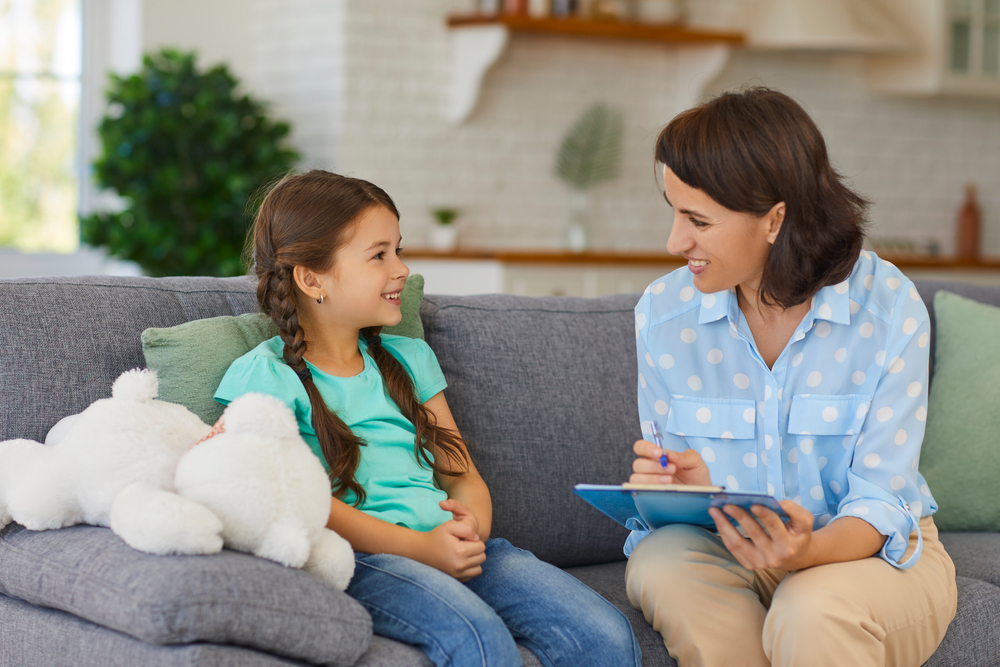Child and adolescent psychotherapy is a form of psychiatric treatment involving a variety of techniques, approaches, and interventions that is designed for infants, children, young people, and their families who may be experiencing complex emotional and/ or psychological difficulties.
Outcome measures assess whether the child receiving psychotherapy experiences improvement in mental health symptoms and functioning across various domains of life. The efficacy of child psychotherapy will depend on a variety of contributing factors.
Still, there are three therapeutic elements that are fundamental to adolescent treatment success and can be viewed as the differentiating psychotherapeutic factors directly informing a child’s good-outcome and poor-outcome prognosis:
-
- Client characteristics: Research notes that the resources (e.g., persistence, openness, faith, optimism, commitment, reliance, etc.) and outside influences a child brings to the therapeutic process can be a potent outcome contributor in psychotherapy.
- Use of evidence-based practices: Evidence-based psychotherapy encompasses both scientific and local evidence (e.g., diagnostic patient information, situational information including cost and time constraints, and the provider’s judgment, experience, etc.) to achieve the best outcome. Relying on evidence-based principles ensures that child therapists use the best existing evidence as a starting framework, while simultaneously affording them flexibility to individualize treatment.
- Therapeutic relationship: According to the American Psychological Association (APA), “the most important aspect of effective therapy is that the patient and the therapist work together to help the patient reach their goals in therapy.” One study that explored the therapeutic relationship as a change facilitator in different moments of psychotherapy, concluded that a positive therapeutic relationship facilitates early changes in the motivation of children and parents, and provides them with a healing, relational experience. The therapeutic alliance, or the purposeful collaborative relationship between a therapist and the patient, is a critical component of effective psychotherapy and the quality of this relationship is an indicator of treatment outcome.
Evaluating psychotherapeutic outcome is integral to identifying and refining effective treatments for adolescents. Unfortunately, the child and adolescent psychotherapy outcome literature is lacking, and additional research is required to provide an accurate and more conclusive understanding of the specific indicators in child psychotherapy that differentiate poor- and good-outcomes.
Further Information and Support
For most of us, life can be very stressful, leading us to feel emotionally charged, which can cause anxiety, panic attacks, depression, and getting stuck in a cycle of being burdened with negative thoughts. Navigating through the challenges and emotional turmoil of life can be overwhelming, but you do not have to go through it alone. Engage Treatment is a Joint Commission Accredited professional psychological practice. We specialize in treating children, teens, and young adults struggling with depression and anxiety through community-focused treatment plans that incorporate a carefully selected combination of therapeutic interventions. Our compassionate, multidisciplinary practitioners are devoted to providing the highest quality of care that helps ignite positive change and enables clients to reach optimal health and well-being. Please do not hesitate to reach out for guidance. We are happy to answer questions and provide you with any additional information. Feel free to call us at 805-497-0605 or email us at [email protected]. You are also welcomed to get in touch by filling out our contact form. We look forward to connecting and having the opportunity to discuss how we might best be able to support you.
Contact Us
Westlake Campus:
IOP Program
2625 Townsgate Road, Suite 210
Westlake Village, California 91361
Agoura Campus:
Private Therapy & Parenting Program
30300 Agoura Road, Suite 250
Agoura Hills, CA 91301
805-497-0605
805-371-4862











© 2023 Engage Treatment Program, Inc. All Rights Reserved.
LGBTQ Friendly
About
• About Engage
• Our Team
• Career Opportunities
• Individual / Family Therapy






